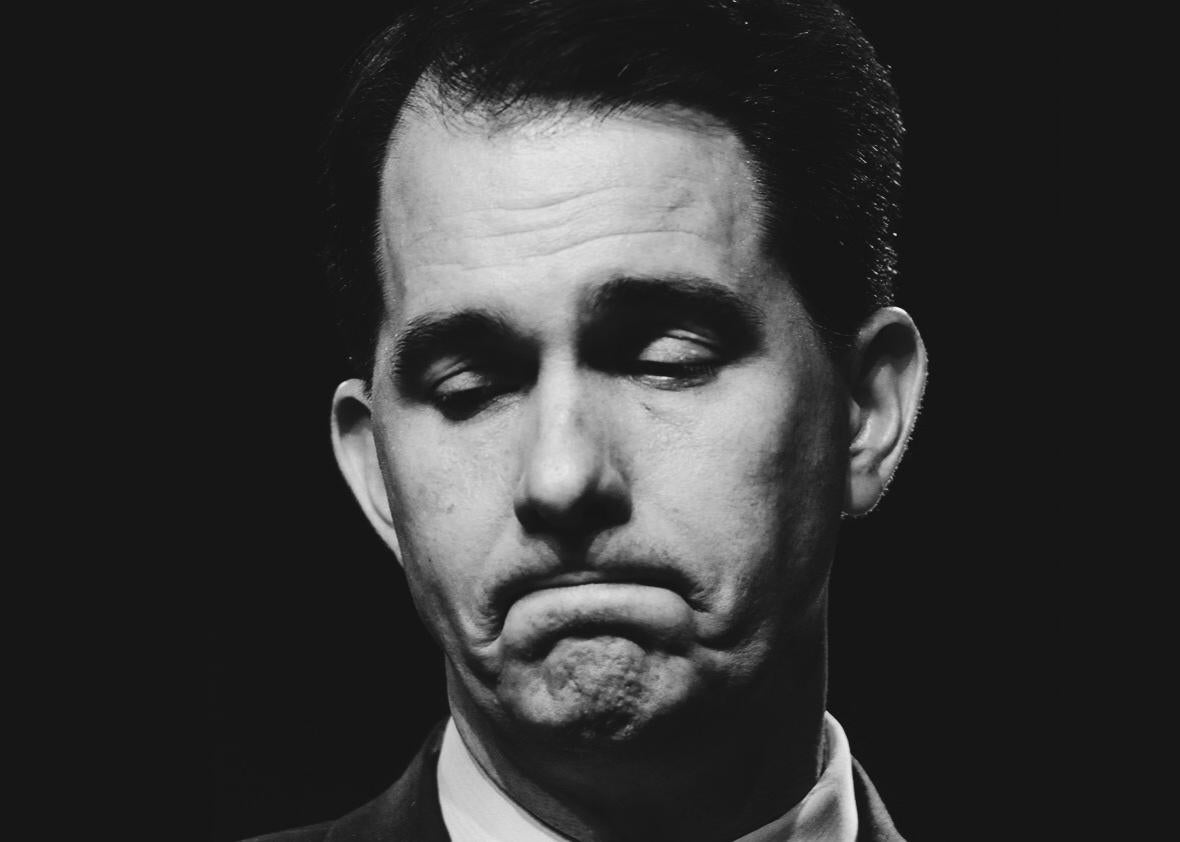Ten weeks ago, when he announced his campaign for president, Wisconsin Gov. Scott Walker was “fighting to win.” “Americans deserve a president who will fight and win for them,” he said. “Young or old—or somewhere in between—I will fight and win for you.” Likewise, last week, he promised to “wreak havoc” on Washington with unapologetic conservative values. “I have a plan to move this country forward,” Walker said. “To wreak havoc on Washington, America needs a leader who has been tested. I have been tested like no one else in this race.”
On Monday, Walker walked this back. Yes, he was tested. But it wasn’t enough, and now he’s leaving the race. “Today, I believe that I am being called to lead by helping to clear the race so that a positive conservative message can rise to the top of the field,” he said in a statement. “With that in mind, I will suspend my campaign immediately.”
What happened? The immediate problem was money. Yes, Walker had billionaire donors and a flush super PAC. But that cash can’t fund offices and pay staffers. “No matter how much money in the super PAC, hard dollars still matter,” said Gary Marx, a senior adviser to the Walker campaign, in an interview with the Washington Post. “He didn’t have the finances to continue on. Money is ultimately what stops campaigns from going further.”
This makes sense. Walker couldn’t raise the money it took to support a staff-heavy investment in Iowa, and so, he left the race. But even this raises other questions.
Walker, after all, was supposed to be the perfect conservative candidate, an ideologue who could bridge the gap between the grassroots and the establishment. But Walker wasn’t up to the task. It’s possible, as Daniel Larison argues for the American Conservative, that he was never as strong as he looked and doomed to eventual failure. But this underplays his assets (a conservative record in a blue state with three election victories) and overstates his weaknesses (a dull style and personality). Put differently, everyone looks bad after their worst moment. If it were Sen. Marco Rubio, for instance, we’d point to a mixed political record: One statewide political victory—in a three-way race in an unprecedented Republican wave election—and a failed push for comprehensive immigration reform, abandoned after conservative criticism.
No, Walker was capable. His problem was more structural: This is an unusually difficult field. If Walker were running for 2012, he’d face two real challengers: Mitt Romney and Rick Perry. Instead, he was up against an army of vanity candidates, factional fighters, and plausible nominees, from Rubio, Jeb Bush, Gov. John Kasich, and Gov. Chris Christie on the establishment side to Donald Trump, Ben Carson, Carly Fiorina, and Sen. Ted Cruz on the grassroots one. In this field, Walker couldn’t make mistakes. If he ignored establishment concerns or piqued grassroots anger, his balancing act was over. At the same time, he had to hone rhetorical skills and build a media presence, to energize supporters and win curious Republicans to his side.
By itself, this is difficult. With Trump in the race, it’s almost impossible. He dominates media and siphons conservative voters. For establishment candidates, this is a modest problem. If they come too close to Trump—if they swipe and fight—they risk a bruising battle that could harm them in the polls. At the same time, they can turn away. They’re not fighting for his voters. Instead of tussling with Trump, they can fight for more moderate Republicans, and return to the fray when Trump is diminished or gone.
If you’re vying for conservatives, it’s even worse; Trump consumes your oxygen and there’s no way to fight back—you can’t out-Trump the man himself. Cruz solved this by making an alliance with Trump, all but backing him against the rest of the party.
Walker could have followed Rubio and ignored Trump, working to build his ground with more moderate voters. Instead, he tried to beat Trump at his own game, swinging to the right with every question on immigration, and swinging back when he couldn’t take the heat. He soured himself for activists and alienated party elites. That, however, wasn’t the end. There were still the debates, where Walker could distinguish himself against his opponents. But he couldn’t break through.
After his first lackluster debate, Walker declined to single digits. After the second, when he was virtually invisible, he sank to 0 percent in the polls. He found himself flanked by Trump (with Carson and Fiorina) on the right, and Bush (with Rubio, Kasich, and Christie) on the left.
Without elites or the public, Walker was finished. And so he quit, the second candidate to leave the Republican race. The lesson is straightforward: In a crowded field with strong contenders, every move counts. If Walker were running in 2012, against a weaker field, he might have survived. As it stands, why would anyone choose the guy who can’t win a fight or make a mark?
It’s hard to say what comes next; primaries have patterns, but so much is contingent on the individual campaigns and personalities. With that said, the end of Team Walker is good news for the GOP establishment. Now, there are fewer people vying for the same votes. If the grassroots is going to win this primary—the eternal goal of movement conservatives—it will have to beat a more unified field of moderate and mainstream Republicans.
